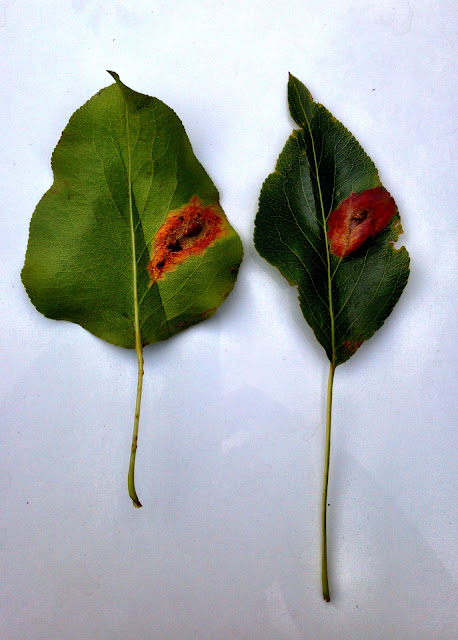photo TCC
For the Bradford pear the long reign as the most trouble
free tree may have come to an end. Recent laboratory confirmed cases of Pear
Trellis Rust Gymnosporangium sabinae
have been located in the North Eastern United
States . While it has been present in Southern Ontario since 2007 and is a common disease in the Pacific North East
and Europe it has not been discovered beyond those areas. Pears, up to this point,
have been free from most pests and had only their poor structure to cause
problems in the landscape.
Like most rusts, Pear Trellis Rust requires two distinct
hosts at different times of the year. The summer host, the pear, is the most
disfigured by the rust and may become completely defoliated if the outbreak is
severe. Repeated unchecked out breaks could result in die back and mortality.
The winter host, the juniper, is much less severely affected. The disease over
winters as a gall on the juniper erupting in the spring with bright orange
gelatinous fruiting structures called telia. These structures produce spores
that are blow in the wind to the nearest pear. Under ideal conditions these can
travel up to four miles. The effect on
landscape trees is dramatic. After the initial infection causing reddish orange
blotches on the leaves the leaves turn brown they will fall from the tree throughout
the growing season. On fruit trees it will damage a crop in short order. While
the life-cycle of this disease is complicated, its unsightly effect on pears is
simply awful.
All pears appear to be susceptible to varying degrees. Cultural
controls like removing junipers from the area are not realistic given the close
proximity of the two hosts in a typical landscape. Even if you were able to
remove your junipers the possibility of there not being one in the area to act
as a secondary host is remote. As this is a newly discovered disease treatment
plans are still in the developmental stage and no fungicides are currently labeled
to control this disease. One suspects that in time a treatment regime similar
to apple rust will emerge and prove effective in controlling this new found nemesis
of pears.
Take the time to contact your ISA Certified Arborist today
and have your pears accessed for the potential impact of Pear Trellis Rust.
Panic is pointless, preparation is priceless.



No comments:
Post a Comment